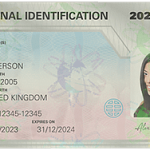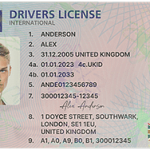Creating and using fake ID cards is a practice that raises a multitude of ethical concerns. At its core, ethics is about determining what is right and wrong, and the matter of fake ID cards delves deep into this moral quagmire.
The Unethical Nature of Creation
When someone creates a fake ID card, they are engaging in a form of deception. The very act of forging personal information – such as name, date of birth, and photo – is a violation of truth – telling. In an ethical society, honesty and integrity are highly – prized values. By fabricating an ID card, the creator is going against these fundamental principles. For example, if a person creates a fake ID to make themselves appear older than they are, they are falsifying a crucial piece of personal data that is meant to be accurate and verifiable.
Furthermore, creating fake ID cards often involves illegal activities. It may require the use of counterfeiting equipment and software, which are typically prohibited by law. This illegal aspect not only undermines the legal system but also the ethical fabric of society. The creator is willing to break the law for personal gain, whether it’s to access age – restricted venues, obtain false identification for other illegal activities, or for some other self – serving purpose. This sets a bad precedent and can contribute to a culture of lawlessness and unethical behavior.
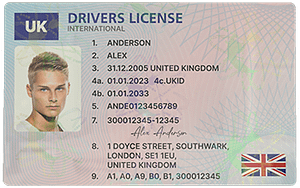
Another ethical concern related to the creation of fake ID cards is the potential harm it can cause to others. For instance, if a fake ID is used to obtain credit or other financial services fraudulently, it can lead to financial losses for individuals, businesses, or financial institutions. This kind of harm extends beyond the immediate act of creating the fake ID and can have far – reaching consequences for the victims.
The Ethical Dilemma of Usage
Using a fake ID card also presents significant ethical problems. When an individual uses a fake ID, they are engaging in a form of fraud. They are misrepresenting themselves to others, whether it’s to gain entry into a bar or club, purchase alcohol or tobacco, or to obtain services that are restricted based on age or identity. This act of deception undermines the trust that society places in identity verification systems.
For example, in the context of underage drinking, using a fake ID to buy alcohol is not only illegal but also unethical. It goes against the social and legal norms established to protect the well – being of minors. Minors are not considered mature enough to make informed decisions about alcohol consumption, and using a fake ID to bypass these restrictions is a way of flouting the rules put in place for their own good. This can have negative health consequences for the underage user and can also contribute to a culture of irresponsible behavior among young people.
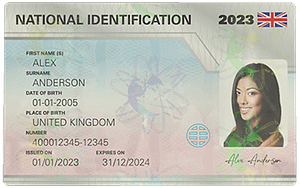
Moreover, using a fake ID can have broader social implications. It can lead to a breakdown in social order and a lack of respect for the law. If people believe that they can get away with using fake IDs without facing consequences, it can erode the overall sense of ethical responsibility in society. Additionally, it can put the safety of others at risk. For instance, if a person with a fake ID is involved in an accident while under the influence of alcohol obtained through fraudulent means, it can cause harm to innocent bystanders.
Impact on Identity and Society
The creation and use of fake ID cards also have implications for the concept of identity. Identity is a fundamental aspect of who we are, and when it is manipulated through fake IDs, it can lead to a distortion of self – perception and social perception. For the person using the fake ID, they are presenting a false version of themselves to the world, which can have psychological consequences. It may lead to a sense of inauthenticity and a lack of self – acceptance.
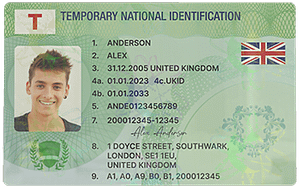
On a societal level, the prevalence of fake ID cards can undermine the integrity of identity verification systems. These systems are in place to ensure security, protect the rights and interests of individuals, and maintain social order. When fake IDs are used, it becomes more difficult to accurately identify people, which can pose risks in various areas such as law enforcement, national security, and access to essential services. For example, in the case of border control, if fake IDs are being used to cross borders, it can pose a threat to national security by allowing unauthorized individuals to enter the country.
Common Problems and Solutions
- Problem: Underage Access to Age – Restricted Venues and Products
Solution: Strengthening ID verification processes in places such as bars, clubs, and stores that sell age – restricted items. This can include using advanced ID scanners that can detect fake IDs more accurately. Additionally, educating young people about the risks and unethical nature of using fake IDs to access these venues and products can help deter them from engaging in such behavior. Schools and parents can play a crucial role in this education process, highlighting the potential legal, social, and health consequences.
- Problem: Fraudulent Use of Fake IDs for Financial Purposes
Solution: Financial institutions need to enhance their identity verification procedures. This can involve multi – factor authentication methods, such as combining something the person knows (e.g., a password), something they have (e.g., a mobile device for one – time passwords), and something they are (e.g., biometric data like fingerprints or facial recognition). Law enforcement agencies should also increase their efforts in cracking down on the creation and distribution of fake IDs used for financial fraud, and impose harsher penalties on those involved.
- Problem: Difficulty in Detecting Fake IDs
Solution: The development and implementation of more advanced ID technologies. For example, using holograms, microprinting, and other security features that are difficult to replicate. Training personnel who are responsible for ID verification, such as bouncers, store clerks, and border control officers, on how to spot the signs of a fake ID can also be highly effective. Regular updates to these training programs to keep up with the latest counterfeiting techniques are essential.
- Problem: Lack of Awareness about the Ethical Implications
Solution: Public awareness campaigns can be launched to educate the general public about the ethical issues associated with creating and using fake ID cards. These campaigns can use various media channels, such as television, radio, social media, and print, to reach a wide audience. Community organizations and non – profit groups can also play a role in spreading the message about the importance of honesty and integrity in identity verification.
- Problem: Online Sale and Distribution of Fake IDs
Solution: Internet service providers and e – commerce platforms should take more responsibility for monitoring and removing listings related to the sale of fake IDs. Law enforcement agencies should target online marketplaces and websites that are involved in the illegal trade of fake IDs. Stricter regulations and laws can be put in place to penalize those who facilitate the online sale and distribution of fake IDs, and international cooperation can be enhanced to combat cross – border illegal activities related to fake IDs.


